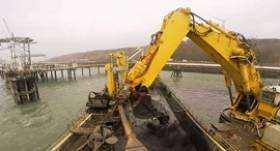Displaying items by tag: Dredging Completed
Dredging Completed At South Wales Port after Stormy Winter
#Dredging - A £1.5m dredging campaign at the Pembrokeshire Port of Milford Haven, to clear the shipping channels and berths has been completed.
The work is an essential part of ensuring the waters leading to and around the terminals on the river remain deep enough for some of the larger ships that use them.
Nearly 180,000 tonnes of fine silt and sand have been cleared from along berths and channels in the port over three months. The dredgers have had to work around several major storms over the period between December and March.
The work formed part of a joint campaign involving the Port of Milford Haven and a number of the other energy companies who operate terminals along the river.
“A campaign on this scale is carried out every ten years,” explained the Port of Milford Haven’s Harbourmaster, Bill Hirst. “It is vital to dredge in order to keep the UK’s biggest energy port open for business. It’s tempting to think a natural harbour such as Milford Haven is always easy to access for even the largest ships. However, the river is constantly depositing material on the seabed. We regularly need to clear out the channels so ships have plenty of room to manoeuver,” Bill continued.
The Port of Milford Haven carries out annual hydrographic surveys of the river bed to monitor build up of silt in the channels. “We have a legal duty to accurately state the depth of waters in the port,” said Bill. “With data going back several years we have a pretty clear idea how often we need to dredge to make sure those stated depths remain accurate.
Several dredging vessels were used to carry out the task. The largest was a 26,000 ton, 150m long ship the Bartolomeu Dias. In order to clear behind terminal jetties, the smaller vessel Mimar Sinan was deployed, equipped with a digging bucket capable of lifting more than 40 tonnes of material in one scoop.
The dredged material is taken to a licensed depositing ground 20 miles offshore.





























































